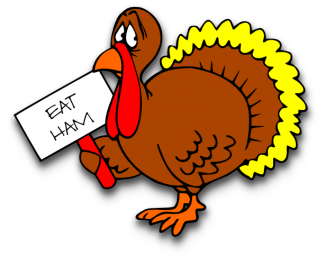Sir Gobble
Bessie Curtis resided with her aunt and uncle on a farm. She was very worried. Bessie enjoyed the country, and she loved her uncle and aunt. However, something deeply disturbed her. As the summer passed and the autumn came, she had moments when she looked incredibly sad. What was the reason for her sadness? I can tell you, because I was there.
Early in the spring, her uncle had given her a young turkey. "There, Bessie," he had said, "that is one of the prettiest turkeys I have ever seen. I will give him into your care, and on Thanksgiving Day we will have him on the dinner table."
For some time, Bessie fed the turkey every day without feeling particularly fond of him. Very soon, however, he began to know her; he not only ran to meet her when she brought him his corn and meal, but he would follow her about just the way Mary's little lamb followed HER about.
Her uncle often called after her, "And everywhere that Bessie goes, the turkey's sure to go." Yes, round the garden, up and down the avenue, and even into the house itself the turkey followed Bessie. Then why was she so sad? Alas! She remembered her uncle's words when he gave her the turkey, "On Thanksgiving Day we will have him on the table." Thanksgiving Day would be here in a week.
Now, if Bessie had been like some little girls, she would have told her trouble to her uncle. But, she never mentioned it to anyone, although she cried herself to sleep several nights before Thanksgiving Day.
At last the day came, and Bessie, instead of going out to the yard as usual, kept in the house all the morning. She was afraid that if she went outside, she would not find her beloved friend. Dinnertime came and, with a heavy heart, she seated herself at the table. Her uncle and aunt saw how upset she seemed.
"Come, come,” said her uncle, "We must cheer up; there are no sad looks on Thanksgiving Day. Maria, BRING IN THE TURKEY." Poor Bessie! She could not bring herself to look up as the door opened, and something was brought in on a big platter. As the platter was placed on the table, she saw that it did indeed hold her turkey, but he was alive and well.
Her uncle said, "Why, Bessie, did you think I would kill your pet? No, indeed, but I told you he should be on the table Thanksgiving Day, so here he is."
Then Bessie's uncle struck the turkey gently with his carving knife, the way the queen strikes a man with a sword when she makes him a knight.
"Behold!" said Bessie's uncle, "I dub you 'Sir Gobble;' you shall never be killed, but die a natural death, and never be parted from Bessie."
Now, you may guess who I am. I was there all the time. I have feathers.
